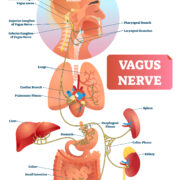The Vagus Nerve & Vagus Nerve Stimulation
By Helena Amos, M.Ac., L.Ac., Euro. Physician
One of the most effective and comprehensive treatment methods available to health care providers is linked to a particular nerve in the body few people have heard of—the Vagus Nerve. Let’s take a closer look at this fascinating and far-reaching anatomical network.
There are 12 cranial nerves in the body. They come in pairs, left and right, and link the brain with several areas of the body, including the head, neck, chest, abdomen and pelvis. Vagus is the longest of the cranial nerves, coming from the brainstem and running throughout the whole body to the colon, thereby earning its name as the “wandering nerve.”
Because the vagus nerve has the widest distribution in the body, it affects a broad span of bodily functions from gut-brain axis communication, to neurotransmitter management, to hormone balancing, to inflammation prevention. It is responsible for both sensory (i.e., the five senses) and motor functions. Sensory function is felt on the skin, or in the mouth or throat. Visceral sensations are felt in the organs, such as the larynx, esophagus, trachea, lungs, heart, and most of the digestive tract. Motor functions of the nerve include muscle stimulation of the pharynx, larynx, roof of the mouth, and muscles of the heart (it helps to lower the resting heart rate). It also stimulates involuntary contractions of the digestive tract through the esophagus, stomach and intestines, allowing food to move and to digest.
The vagus nerve is also a vital part of your parasympathetic nervous system, or the functions that occur when the body is at rest—the so-called “rest and digest” or “feed and breed” functions, like breathing, salivation, urination, sexual arousal, and more. A properly functioning vagus nerve is a kind of contradiction, in that it means your body is actively at rest, actively relaxing, actively operating on a kind of autopilot for those systems the nerve is responsible for controlling or affecting.
When vagus nerve activity is low, known as low vagal tone, it indicates your vagus nerve is not functioning optimally, and this can create a host of physical, mental and emotional problems over time, ranging from anxiety and stress to diarrhea or constipation. To further complicate matters with this complex nerve, overstimulation of vagus can have negative consequences as well. For example, overstimulation in a fight or flight situation is a common cause of fainting due to excessive signals to the vagus nerve causing heart rate and blood pressure suddenly to drop.
Disorders of the vagus nerve include:
• Difficulty speaking, as well as loss of voice, hoarse voice or wheezing
• Difficulty swallowing fluids and loss of gag reflex
• Pain in the ear canal
• Changes in heart rate, palpitations and fibrillation
• Abnormal blood pressure, fainting
• Arthritis
• Angina
• Decreased production of stomach acid, nausea or vomiting, abdominal bloating or pain
• Anxiety, depression or other mood disorders from neurotransmitter imbalances
• Deficiencies in B vitamins, essential fatty acids due to absorption issues
• Balance issues, motion sickness
• Fatigue
• Poor memory or focus
• Liver dysfunction
Vagus Nerve Stimulation
When you strengthen the vagal tone, you increase your body’s ability to adapt to stress and realize all the associated benefits that come with that improvement. Health care professionals accomplish this through the use of Vagus Nerve Stimulation (VNS), which has created a new field of study and treatment in conventional and alternative medicine. For instance, stimulating the vagus nerve helps remission of Rheumatoid arthritis and other autoimmune diseases by inhibiting inflammation. It also helps make memories by affecting the amygdala in the brain, which may be a promising Alzheimer’s treatment approach. And the method has been used as a treatment for epilepsy, anxiety and depression, and pain management.
Administered either manually or with electrical stimulation, VNS encompasses a variety of techniques that have shown to treat several vagus nerve ailments effectively. Professional health care providers can strengthen the vagus nerve without surgically-embedded electrical stimulation by employing the following methods:
• Ear electro-stimulation acupuncture, or acupuncture treatment of the vagus nerve by treating related ear and body points
• Vagus nerve stimulator ear clip device
• Stabilization of cervical vertebrae through physical therapy, osteopathy and acupuncture
• Parasympathetic nervous system exercises given by a physical therapist
• Nutritional supplements, especially B complex and essential fatty acids, to nourish the vagus nerve, decrease inflammation
• Stabilizing digestion by normalizing HCL, enzymes, evacuation and absorption
• Applying specific massage and craniosacral therapies
• Implementing a whole, unprocessed foods and anti-inflammatory diet
You can also strengthen the vagus nerve on your own using these simple, natural VNS methods:
• Alternate nostril breathing
• Cold compresses to the face and back of the neck; taking cold showers
• Being still, quiet and relaxed
• Slow and deep belly breathing
• Holding your breath for 4-8 counts
• Exercising, especially Yoga and Tai Chi, within your ability, especially if you are being treated for cervical (cervical vertebrae) stability (consult your doctor for direction here)
• Chanting and humming; rhythmic, meditative singing (OM)
• Listening to melodic relaxing music; avoiding loud raucous music
• Meditating
• Connecting with nature and getting plenty of direct sunlight
• Nurturing social relationships and laughing often
Stimulating the vagus nerve can operate as a treatment for the signs, symptoms, and diseases listed above. As you can see, many of these forms of treatment involve lifestyle changes, which means you can safely adopt more than one of these practices to increase the vagal tone index. The clinical effects of the above methods, individually or cumulatively, are:
• Improved quality of life
• Decreased body pain
• Increased quality of sleep
• Reduced inflammation
• Improved mood and reduced depression or anxiety
• Resolved acute migraine and cluster headaches
• Improved metabolism and supported weight loss
• Improved heart function; decreased heart rate, blood pressure and atrial fibrillation; decreased angina
• Decreased tinnitus
• Improved digestion; reduced heartburn, acid reflux
We still have much to learn about the vagus nerve, and the potential applications from stimulation to treat and heal any number of disorders. However, the future of this incredible nerve network is bright and promising for advancing conventional as well as complementary and alternative medicine.
If you have a condition that might benefit from Vagus Nerve Stimulation, please contact our office to discuss further with a free 20-minute consultation: 301-881-2898 or email doctorhelena@gmail.com.



